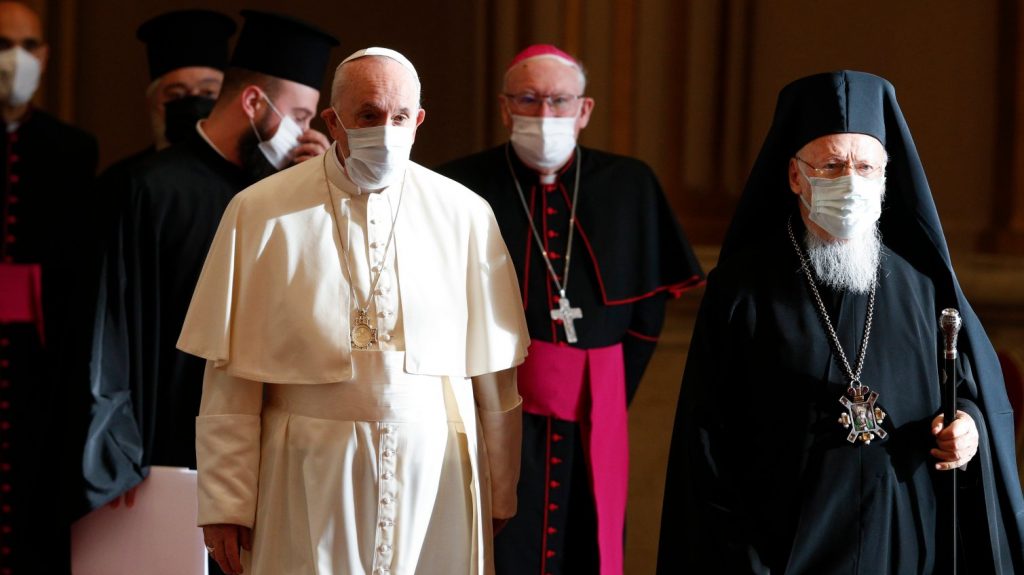In a majestic room at the heart of the Vatican’s apostolic palace, and surrounded by greenery set out for the occasion, leaders of the world’s faith traditions signed an appeal addressed to those who will negotiate the future of the environment in an upcoming United Nations summit in Glasgow.
The appeal calls for the world to achieve net-zero carbon emissions as soon as possible to limit the global average temperature rise to 1.5 degrees Celsius above pre-industrial levels; presses wealthier nations to step up their climate action at home and financially supporting vulnerable countries to address climate change; and calls on governments to be more ambitious in transitioning to clean energy and sustainable use of land, with eco-friendly food systems and responsible financing.
The faith leaders also commit themselves to greater climate action, particularly in the fields of education on caring for the environment and also choosing green investments for their faith communities.
In a surprise move, the pope set aside his prepared remarks, telling participants to read them instead, so other speakers would have the opportunity to address the meeting.
Speakers included Italian Cardinal Pietro Parolin, the Vatican’s Secretary of State; a young woman representing a youth climate meeting held last week in Milan, the COP26 President-Designate Hon Alok Sharma; and Italian Minister of Foreign Affairs, Luigi Di Maio, co-chair of the November summit in Glasgow.
In his written remarks, Francis presented three concepts that he believes can guide the reflection on deepening the dialogue between faith and science in favor of protecting God’s creation: “Openness to interdependence and sharing, the dynamism of love and the call to respect.”
“Today’s meeting, which brings together many cultures and spiritualities in a spirit of fraternity, can only strengthen our realization that we are members of one human family,” the pontiff wrote. “Each of us has his or her religious beliefs and spiritual traditions, but no cultural, political or social borders or barriers prevent us from standing together.”
Each religious leader – the pontiff included – was given two minutes to make their point.
Justin Welby, the archbishop of Canterbury, called for a “rapid change in taxation and trade rules that promote green activity,” claimed that over the last century humanity has “declared a war on creation,” and argued that “the world has just enough time to get this right.”
Quaker leader Gretchen Castle argued that “the poorest who have done the least to cause the crisis are the hardest hit,” and that this is the time to “address our over consumption and wasteful habits, and learn to live in a collective, socially supportive world community, respectful of all life” and heed the call to “go and sin no more”
Grand Imam Al-Tayyeb of the Cairo-based Al-Azhar university called on all young Muslims and other religious people to “be prepared to deal with any activity that harms the environment.”
Metropolitan Hilarion, who attended in representation of Russian Orthodox Patriarch Kirill, expressed his hope that the appeal might be “a new beginning for our communities and the whole world.”
“It shall be remembered that the current ecological situation has been caused, among other reasons, by the desire of some to profit at the expense of others, as well as by the desire of unjust enrichment,” he said.
Patriarch Bartholomew of Constantinople called the appeal signed by religious leaders as a “powerful symbolical gesture, precisely because it’s both the outcome of dialogue and a call to continue this dialogue.”
This much-needed dialogue, he said, is among all people of good will – religious or not – who share a common dream “for the sake of our planet and its people, as well as generations to come, that deserve to inherit a better, cleaner world.”
“We need this dialogue in order to sustain the environment, in order to coexist with one another as human beings and as part of God’s sacred human creation, and we need it in order to simple be, breath and love one another,” Bartholomew said.
As noted by Bishop Thomas Schirrmacher, Secretary General Evangelical World Alliance, Bartholomew began the movement of religious leaders advocating for the environment three decades ago, saying that “the future and conservation of our planet and creation is not only a problem of science and politics, but also a problem of faith.”
The seven-page appeal signed by the leaders was the result of months-long negotiations between faith traditions who gathered once a month to draft the document signed on Monday.
Faith groups included the Catholic Church, Orthodox Church, Protestant denominations, Sunni and Shiite Muslims; Jews, Hindus; Sikhs; Buddhists; Taoists; and representatives of Zoroastrianism, Confucianism and Jainism.
The efforts followed an invitation issued by the Vatican, and the embassies of England and Italy to the Holy See. These two countries are co-chairs of the COP26, the 26th United Nations Climate Change Conference to be held in Glasgow this November.

